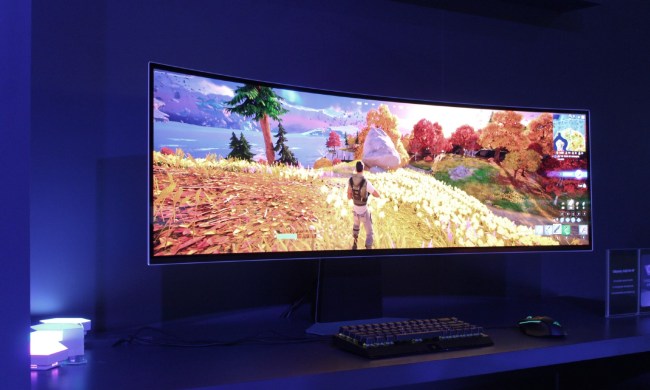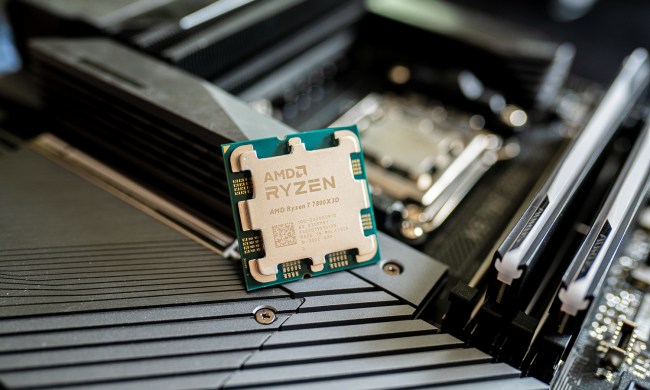“This isn’t just a gaming machine; it’s also a portable workstation, a multi-media powerhouse, and a capable desktop replacement. The Samsung Series 7 Gamer is the only computer you’d ever need. Portability excluded, of course.”
- Pleasing keyboard and touchpad
- The best laptop display we’ve ever tested
- Quick, well-rounded performance
- Affordable (for a gaming laptop)
- Gaudy exterior
- Average build quality
- Subpar connectivity
- Poor battery life
Gaming laptops are the domain of a rather limited crowd. The smaller boutiques, though many in number, all rely on a limited amount of designs from common manufacturers like Clevo. Only the major OEMs have the resources necessary to build something from the ground up, and only ASUS, Toshiba, MSI, and Dell (through Alienware) bother to try. That is, until now.
Deciding that it wants a slice of the gaming laptop pie, Samsung has entered the market with its Series 7 Gamer. Despite the name, this laptop is not a gaming version of the standard Series 7. Designed entirely with gaming in mind, it’s a beast of its own.
Our review unit arrived with a Core i7-3610QM processor, NVIDIA GTX 675M graphics, and 16GB of RAM. This represents a high-end variant selling for $1,799. Less expensive options with AMD Radeon graphics and half the RAM can be had for around $1,449.
Entering the gaming market isn’t easy. ASUS and Alienware are stiff competitors in the mid-range to high-end market, while Toshiba and MSI offer incredible hardware values. Let’s see if Samsung can battle its way into this tightly contested market.
All flash and no substance
There’s nothing that distinguishes the Series 7 Gamer at first glance. Our review unit, which arrived in black, was adorned with only a subtle fade design covering the glossy plastic display lid. The rest of the laptop, both inside and out, featured mundane semi-gloss plastics and metals with a subtle brushed aluminum finish.
That kind of appearance isn’t enough to stand out from the crowd and, in many ways, the laptop comes off as a bit cheap. The chassis creaks when handled roughly, the display lid shows flex when handled, and every surface feels thin rather than substantial.
Samsung’s aesthetic turns towards cheesy when the laptop’s high-performance mode is engaged via a hardware switch. The keyboard’s backlight turns on, the power and sound LEDs turn to blue, and the Turbo dial comes to life while an on-screen animation is played. It’s meant to be cool and hip but instead comes across as immature and gaudy.
Connectivity doesn’t save the design, either. Samsung offers four USB ports, two of which are USB 3.0. Video outputs include HDMI, DisplayPort, and VGA. Audio jacks for headphones and microphone are provided, but some competitors support 5.1 surround sound.
A desktop keyboard experience
Small is not a word used to describe the Series 7 Gamer, but that’s not necessarily a bad thing. The size of the Series 7 Gamer has its advantages, one of which is ample room for a comfortable keyboard. Typing on this laptop is hardly different from using a desktop – and that’s a huge compliment. There’s ton of space, decent key travel and a numpad with full-sized keys. ASUS is at least on par in this area, but Alienware, Toshiba, and MSI could take some lessons from Samsung.

Touchpad quality is another high point. The touchpad is large, responsive, and it does a good job at handling both multi-touch gestures and tap-to-click. Most competitors, under the assumption that people will be using an external mouse, choose the cheap way out in terms of a touchpad. We’re glad that Samsung didn’t follow that lead.
Raising the bar on display quality
Samsung hasn’t pulled any punches with this laptop’s 1080p display. It proved capable of rendering a mind-blowing 98 percent of the sRGB spectrum, while also reaching a maximum brightness of 338 nits and the lowest black levels we’ve ever encountered in a laptop.

In real-world use, this can cause problems because streaming 1080p video can’t keep up with the laptop. Artifacts and color banding that’s obscured on a less impressive device becomes visible. High-quality media, like Blu-ray discs and 3D games, on the other hand, are absolutely wonderful. And we can hardly knock Samsung for exposing flaws in streaming video that competitors aren’t competent enough to render.
Audio quality is on par with the competition. It’s loud enough to fill a small room at maximum volume and includes enough bass to competently reproduce music and movies. Some frequencies of bass caused vibrations in the chassis, however, which proved an annoying distraction.
As loud as it needs to be
We found that the Series 7 Gamer was surprisingly cool and quiet at idle. Temperatures hovered around a maximum of 86 degrees Fahrenheit, and fan noise did not exceed 43 decibels. Both results are good for a gaming laptop, and running the laptop at full load barely budged them. Temperatures remained almost the same, and noise increased by just two decibels.

Leave it at home
The Series 7 Gamer’s 17.3-inch display and 9-pound weight tells you what you need to know about portability. Most messenger bags and many laptop cases can’t accommodate it; and even if you could carry it, would you really want to?
Battery life benchmarks produced results that further banished any notion of portable use. Even with its energy conserving “Green Mode” activated, the laptop lasted just 1 hour and 57 minutes in our heavy load test, lasted 2 hours and 42 minutes in our light load test. The Peacekeeper Web browser benchmark drained the battery in 2 hours and 22 minutes. Switching to the maximum performance preset reduced battery life by 1 hour and 34 minutes in the same test.
Power testing made it obvious that such poor results are unavoidable. Even at idle, the laptop used as much as 42 Watts of power. Loading the processor raised power consumption to 82 watts and, when gaming, consumption jumps to over 100 watts.
A clean installation
Our review unit arrived with Windows 7 64-bit and a refreshingly clean desktop. The only obvious pre-installed app is a Software Launcher found in the taskbar. Opening it provides access to several different apps including the crucial Easy Settings menu that can be used to control features like keyboard backlighting, power management, and more. This same menu can be accessed using a keyboard shortcut.
Outstanding performance
Gaming laptops are all about performance. Luckily, Samsung’s first gaming laptop doesn’t disappoint. Its Core i7-3610QM quad-core processor cranked out a score of 98.75 GOPS in SiSoft Sandra’s Processor Arithmetic benchmark. It also managed a combined score of 18,483 in 7-Zip. Both results are competitive with the fastest gaming laptops we’ve tested.
PCMark 7 reached a respectable final score of 3,489. The laptop’s mechanical hard drive was the only drag on the score. We’re beginning to think that gaming laptops should come standard with solid-state drives. It doesn’t look good for expensive gaming laptops to come without a feature that’s included in Ultrabooks that cost hundreds less.

Real-world gaming found the laptop capable of handling just about anything. Skyrim and Diablo 3 both played extremely well, even at maximum detail. Gamers who buy this laptop will be able to enjoy all the latest titles without issue. And, because the display is of such high quality, even old games can seem very attractive.
Conclusion
We’re able to appreciate the laptop’s incredible hardware in spite of its design shortcomings. This isn’t just a gaming machine; it’s also a portable workstation, a multi-media powerhouse, and a capable desktop replacement. The Samsung Series 7 Gamer is the only computer you’d ever need. Portability excluded, of course.
That doesn’t mean the Series 7 Gamer is the only computer you’ll want, however. A collection of understandable tradeoffs add up to a versatile but dull laptop that only truly excels in one area: the display. Alienware and ASUS will appeal more strongly to those who care about quality and aesthetics, while MSI and Toshiba can often provide a better bang for your buck. Samsung is the sensible middle-ground in a category dominated by extremes.
Highs
- Pleasing keyboard and touchpad
- The best laptop display we’ve ever tested
- Quick, well-rounded performance
- Affordable (for a gaming laptop)
Lows
- Gaudy exterior
- Average build quality
- Subpar connectivity
- Poor battery life








